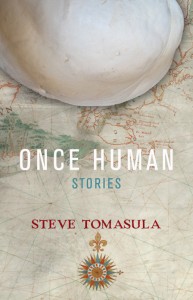
Once Human: Stories by Steve Tomasula
a review by Steve Owen
Steve Tomasula
Fiction Collective 2
320 pages
$22.95
In Once Human: Stories, the idea of the human being hasn’t disappeared or been discarded so much as it’s been multiplied into infinite fields of language, cartography, genetics, genre, history, faith, and surveillance. And while lesser authors might lose hold of their reader in such an abyss of representation and big ideas, Steve Tomasula stitches his infinities together with human threads of desire that offer, however nomadic and transitory, a resting place.
The literary critic Wayne C. Booth argued in The Rhetoric of Fiction that the best writers were those who were able to tell stories that appealed to the reader’s aesthetic interests and practical concerns for character and plot while still positing a weighty intellectual and ethical universe. Since modernism and postmodernism, it’s safe to say the aesthetic isolationism produced by the art for art’s sake ideology has trapped too many writers in a prison house of empty ornamentation and purposeless experiments. On the other hand, other writers — I’ll call them naïve or stubborn realists — reactionary to the insights of contemporary theory, are prisoners of the similarly hollow clichés of a long dead Enlightenment humanism. The first group consider themselves too sophisticated for character or the overt exploration of ideas while the latter wallow in character only for the purpose of affirming their own naturalized beliefs, passing off a banal Philistinism for rigorous intellectual thought. Tomasula is one of the few writers to escape these cells by way of his full engagement with ideas, aesthetics, and desire.
Each story in Once Human synthesizes these three aspects in unique ways. “The Color of Flesh,” for example, tells the story of Yumi, a manga author with an artificial leg who wants to understand precisely the nature of the love (or pervish “itch”) her boyfriend, a performance artist with a fetish for women with physical disabilities, has for her: “Yes, she realized, as surely as there was no one color of skin, there must be loves that fell between labels, between words, rivers of loves — the wine of love — that went right through the finest mesh of letters: more loves that had no name than loves that did and each one being itself just as the crayon labeled “Flesh” could itself be neither true nor false.” To represent the circuit of emotions and identity Yumi experiences during her search for a definition of love, Tomasula regularly alters the typography of the text and inserts a variety of manga images that express her shifting ambiguities and fears: at times, the text is small and cursive or bold and explosive while the images of her body (and disability) range from horror to science fiction or romance.
Another stand-out story in the collection that exemplifies Tomasula’s rich approach to fiction is “Medieval Times,” a modern day knight’s tale located in a Saunders-esque theme park that explores a lowly gong farmer’s (a toilet/shit cleaner’s) dangerous pursuit for a faux knight’s lady; regularly disrupted by sections that journey into endless questions on science and religion — e.g., “Polar Bears as Canary in the Mineshaft” or “More Theological Questions” — the story’s structure, which juxtaposes the human desire for love with the human desire for Logos (meaning), suggests the two are similarly undecidable due to our own answers being, in principle, infinite; nevertheless, we decide anyway — sometimes to the death — by one’s own arbitrary, or medieval, self-representation.
While occasionally leaping to lyrical heights, Tomasula’s prose in Once Human usually reads like the domestic or social realism found in Iowa workshops. The sentences are clear and short; they evoke the tones and rhythms of everyday life, the semblance of the Normative. However, Tomasula’s content — from genetic hybridity to the cartography of the libido — ruptures the stable identity sought by the realist text by injecting multiples into it ad infinitum. For example, while “The Atlas of Man” inserts genetic hybridity into a domestic relationship, opening up the possibility that technology will allow humans to reproduce themselves as saints (or human-animal hybrids) who can turn “bread into flesh,” “Self Portrait(s)” pokes holes in science’s (in)ability to view sexual desire from an objective (or satisfying) position. The overall effect of the tension between Tomasula’s stable prose and his mise-en-abyme identity amount to a deconstruction of traditional realism, revealing its illusionary conceits of style and its ideological failure to represent the world’s multiplicity. In place of identity, however, Tomasula creates a new postmodern, post-human realism that richly traces our infinite potential of self-production, with just enough human left to give it a beating heart.

Steve Owen is the founder of mixer and the e-magazine Resist. He has short fiction and poetry published by The Bend and Flatmancrooked’s Slim Volume of American Poetry, and writes blogs on the anti-art avant garde. He graduated with an MFA in prose from Notre Dame in the Fall of 2013, which he attended on a Sparks fellowship and worked as a managing editor for the Notre Dame Review. Currently, he’s a PhD Candidate in Literature and Fiction at the University of Utah where he teaches composition to chatty freshman. He has three cats and one girlfriend who feeds them.